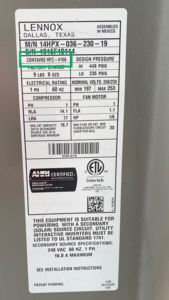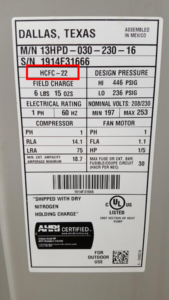Why should you care if your air conditioner uses R-22?
Most air conditioners or heat pumps use one of two refrigerants: R-22 or R-410A. If your system uses R-22 refrigerant, an ozone-depleting substance, your next service bill may be a big surprise. The price of R-22 refrigerant began to skyrocket after the EPA implemented a ban in 2010 on the production and importation of R-22, except for continuing servicing needs of existing equipment. Since January 1, 2020, the servicing of systems with R-22 has relied on recycled or stockpiled quantities of R-22 refrigerant.
You are not required to stop using nor replace existing air conditioners or heat pumps using R-22 refrigerant. However, if the unit needs repairs that require R-22 refrigerant, you may be faced with a hefty bill or the decision of a system replacement.
You can read more about the EPA’s phasing out of R-22 at this link
How do I know what refrigerant my AC uses?
If your air conditioner or heat pump was manufactured and installed before January 1, 2010, there’s a chance that it contains R-22 refrigerant. To check this, simply look at the manufacturer’s label on the unit, it will list the type of refrigerant used. If no label is present or if the label has become illegible, contact a licensed HVAC professional for further examination.


What if my air conditioner uses R-22 refrigerant?
You are not required to replace a functioning air conditioner or heat pump using R-22 refrigerant. The most important thing you can do if your unit uses R22 refrigerant is to properly maintain it. Appropriate servicing minimizes potential environmental damage and maintenance costs. However, if the unit malfunctions and requires service or repair, you may have some expensive choices to make. Below are some options:
Repair the unit
This sounds like the easy choice, but hold that thought. Due to limited and shrinking supply of R22 refrigerant, its price has gone through the roof. As supply becomes more and more limited, it may become cost-prohibitive to service an older unit using R22.
If you do decide to service or repair the unit, it is important to select a reliable service contractor. Technicians must have EPA Section 608 certification to service equipment containing R-22. Request that the technician locates and repairs any leaks instead of “topping off” a leaking system. This method protects the ozone layer and saves you money by optimizing the performance of your existing equipment.
Replace the unit
As stated above, depending on the condition of your air conditioner or heat pump, it may actually be more cost-effective to replace the unit than to repair it. Expenses can add up quickly on an older unit that needs continuous service or repair. Newer equipment is typically more energy efficient and contains more features and benefits than older equipment. New energy efficient air conditioners reduce your energy costs. Even if your air conditioner or heat pump is only 10 years old, you may see significant energy savings by replacing it with a newer, more efficient model.
Call or Email Us Today!
Buying or selling a home in the Jacksonville FL area? Our detailed home inspection consists of a thorough examination of all systems and components of the home. See one of our sample home inspection reports and read our 5-star home inspection Jacksonville FL reviews. We’re always here to answer any questions, whether it’s weeks, months or years after your home inspection. Let our local, Jacksonville FL home inspectors help you make an informed decision.
Bold City Home Inspections provides home inspection services to all of Duval, St. Johns, Clay and Nassau counties. Click the button below for a FREE, no-obligation home inspection quote:
Comments are closed.
Navigation
Business Information
Atlantic Beach, FL 32233
Hours:
Mon – Fri 8am – 6pm
Sat – Sun 8am – 3pm
Home Inspector Proudly Serving:
Home Inspector Blog
- Common Home Inspection Findings in Homes Built Before 1950
- Benefits of Air Quality Testing
- Things to Look for When Touring a Home
- How Long do Asphalt Roof Shingles Actually Last?
- How Long Does a Home Inspection Take?
- Top Tips to Reduce HVAC Energy Costs and Lower Your Energy Bill
- A Basic Guide to Swimming Pool Leaks for Pool Owners





Very energetic article, I enjoyed that bit. Will there
be a part 2?
What’s up to all, how is the whole thing, I think every one is
getting more from this web page, and your views are good designed for new viewers.
Like!! I blog quite often and I genuinely thank you for your information. The article has truly peaked my interest.